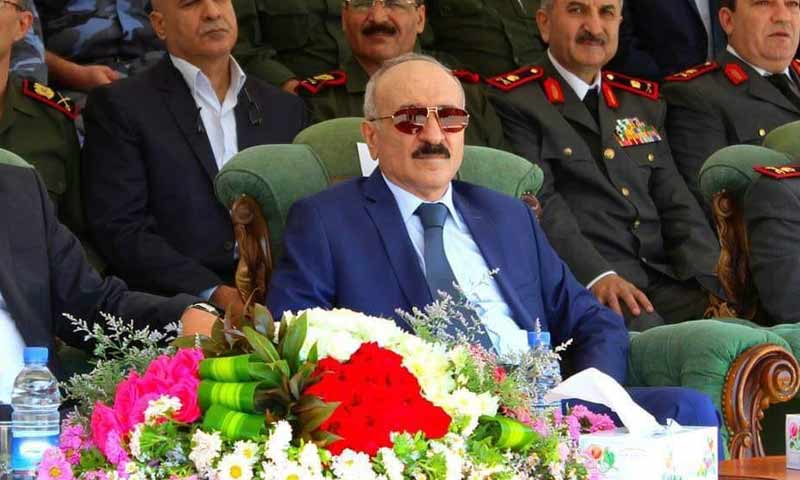



The Syrian General Muhammad Khalid Rahmun has played the executioner in eastern Ghouta and adjacent Damascene neighborhoods, inflicting punishment on those who protested the Syrian regime in 2011, for he is assigned the direct responsibility of the massacres committed in Harasta, Barzeh, al-Qaboun and the Tishreen Neighborhood in the past years, according to ProJustice website, which specialty is exposing war criminals in Syria.
The “Executioner of Ghouta”; the “Chemical Weapons Official” and the “Director of the Death Branch” are all descriptions given to Rahmun, who had a fair share of political and military positions in the past a few years, turning him into one of the key figures of the immediate security circle surrounding the Syrian regime.
On Monday, November 26, Bashar al-Assad, head of the Syrian regime, has issued a degree, under which Rahmun was appointed Minister of Interior, replacing Mohammad al-Shaar, amidst the resentment of Syrian opposition figures.
This indignation arises from the idea that Rahmun’s hands are covered with the blood of dozens of thousands of civilians, young people, women and children, who died under shelling or torture at the Air Force Intelligence Directorate which he headed, according to ProJustice.
Rahmun, born in 1957, is from the city of Khan Shaykhun, southern rural Aleppo. He is considered a key security figure within the Syrian regime, moving between various military and security positions of Assad’s forces since 2014, when he was assigned the director of the Air Force Intelligence Branch in Daraa.
With the break out of the demonstrations in Ghouta, the regime relied on him to face the protestors, for he was assigned the Director of the Air Force Intelligence Branch in the southern region, with its headquarters located in Harasta city, covering the governorates of Damascus and its countryside, Daraa, Qunitera and Sweida.
Following his designation, Rahmun worked to put down the demonstrations in Ghouta and Damascus’ neighborhoods. He met prestigious figures from Ghouta towns, Barzeh and al-Qaboun and demanded that they give in the wanted people and reconcile with the regime.
A former detainee at the Air Force Intelligence Branch, on the condition of anonymity, told Enab Baladi that Rahmun personally supervised the raids and arrests in the cities and towns of Ghouta, pointing out that he has a strict personality and strong memory.
The detainee spoke of Rahmun’s resolution and severity, he showed even to the officers under his command, for he once ordered the arrest of an officer for six months because he smuggled a woman and her daughter from Barzeh al-Balad to Jordan.
He also ordered the detention of a principal officer at the Air Force Intelligence Branch, Mohammad Imad, dubbed “Sakr Quraish” (Hawk of Quraish), for unknown reasons, to be released and then killed in a battle against the “Islamic State” (ISIS) in the Sweida desert, last September, according to the regime’s official narrative.
For its part, ProJustice said that Rahmun supervised the interrogation process and torture that took place at the Harasta Branch, where dozens of thousands of Syrians died under torture, while the still alive detainees were forced to dig tunnels and ditches near the Branch’s building.
Rahmun is also accused of participating in the chemical massacre in Ghouta in 2013, during which 1127 persons died, the names of whom are documented by the “Syrian Network for Human Rights,” while the activists estimate that the number is more than 1400 persons, more than a quarter of whom are women and children.
ProJustice added that Rahmun was one of the supervisors of the chemical weapons experiments, conducted by “Unit 417” under the Air Force Intelligence, pointing out that he was handed the chemical weapons issue after General Ali Mamlouk, who administrated it for several years prior to the revolution.
Due to his crimes and accusations of being a part of targeting Ghouta with chemical weapons, the U.S. has included him with the entities upon which it imposed sanctions early in 2017, with other 17 officials and 6 entities. A few days after the announced sanctions, he was sent as a member of the Syrian regime’s delegation to the first round of the “Astana” talks with the opposition factions in January 2017.
Rahmun, married to a woman from the city of Qardaha, Latakia, al-Assad’s birth place, was promoted to General in 2017 and assigned a deputy to the Director of the Political Security Directorate General Nazih Hassoun, before becoming the director himself after the retirement of Hassoun, to be assigned the Minister of Interior in 2018.
if you think the article contain wrong information or you have additional details Send Correction